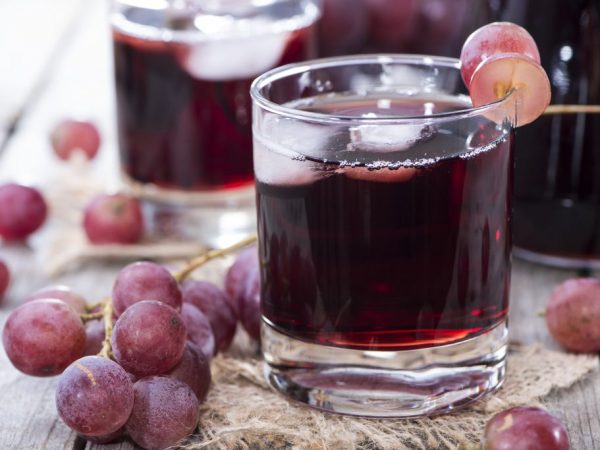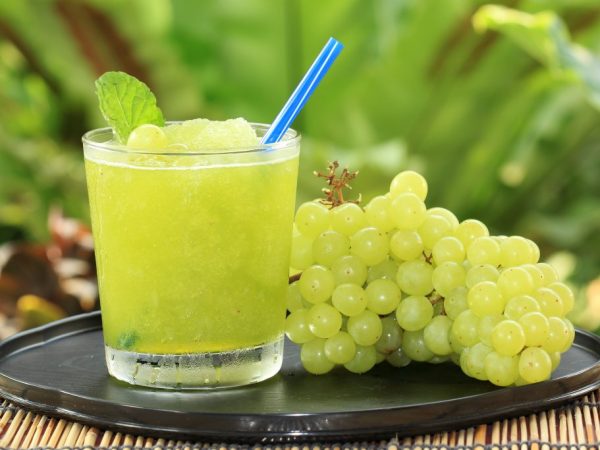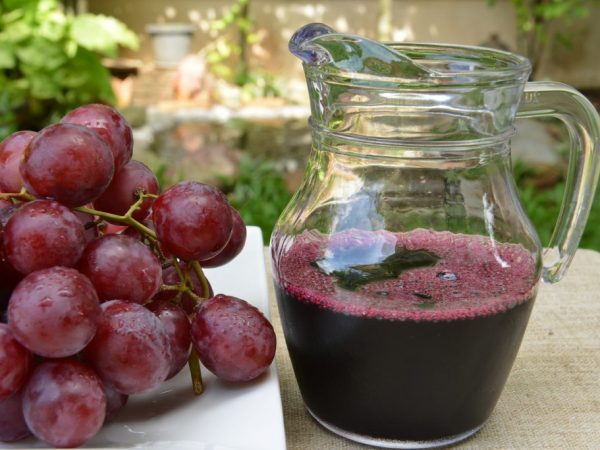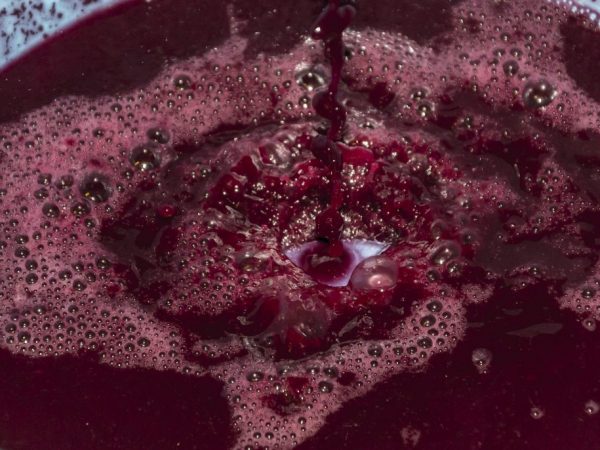Methods for preparing grape juice
Grape juice is one of the healthiest and most delicious natural drinks. Sweet berries contain a large amount of substances beneficial to the body.

Methods for preparing grape juice
Chemical composition
With the regular use of grape juice at home, general well-being improves and immunity increases. This drink contains many useful components:
- fructose and glucose, which saturate the body with strength and energy;
- fruit water - the most valuable source of vitamins, mineral salts, sugar and acid;
- tannins that prevent and eliminate inflammatory processes in the digestive tract;
- organic acids, which accelerate metabolism and normalize acid-base balance;
- vitamins of group B, PP, C, E, which increase immunity and have a beneficial effect on the general condition of the body;
- bioflavonoids (natural antioxidants) that remove toxic components from the body;
- trace elements: magnesium, iron, zinc, phosphorus, potassium, silicon, boron, which normalize the work of all internal systems.
Calorie content
100 g of nectar contains 70 calories, which is 3.3% of the daily intake recommended by nutritionists.
The calorie content of berries is higher than that of grape juice. This allows the product to be included in the diet. It is especially useful for those looking to lose those extra pounds. It also detoxifies the body and promotes fat burning. After drinking a drink with a high content of glucose and sugars, a feeling of fullness sets in, which makes a person forget about snacks.
Nutritional value per 100 g of product is:
- proteins - 0.15-0.9 g;
- fats - 0.2 g;
- carbohydrates - 10-30 g.
The dry matter content in the concentrated drink is 63-65, the density is 1.3 g / cm3.
Healing properties
The beneficial properties of homemade grape juice have long been appreciated by modern medicine. He:
- prevents the development of cardiovascular diseases;
- indicated for stroke and heart attack;
- helps get rid of shortness of breath;
- it is used with strong physical exertion as a restorative agent;
- normalizes heart rate and stabilizes blood pressure;
- treats sore throat, bronchitis, asthma, laryngitis, tuberculosis and pleurisy;
- it is indicated for mental workers, since it stimulates brain activity;
- contributes to the normalization of sleep, improves memory, increases stress resistance;
- contains a large amount of fiber, therefore it is useful for constipation and hemorrhoids;
- has a diuretic effect, so it should be used for chronic nephritis.
Patients suffering from severe disorders of the central nervous system speak about the benefits of grape juice.
All of the above are the reasons why natural grape juice is stored for the winter.
What is the harm

Juice provokes caries
Nectar has more than just beneficial properties.If the rules of consumption are not followed, the juice can cause harm:
- It is drunk before eating, and not during. Drinking a drink with other fluids can cause intestinal upset.
- During the period of treatment, they refuse to ferment drinks: kvass, soda and beer. Grape nectar does not go well with them.
- After each intake, the mouth is rinsed with water: a concentrated drink provokes tooth decay.
- With diseases such as gastritis, cholelithiasis, obesity, exhaustion, the drink is consumed in limited doses.
To get the most out of the product, nutritionists advise drinking it on an empty stomach three times a day. In the first doses, the dose is 200 g, on the following days it is increased to 400 g per dose.
Contraindications
Nectar has some contraindications. Fresh pressed, as well as natural concentrate is contraindicated in women during pregnancy, starting from the third trimester.
Until the 28th week of gestation, such a drink is useful for both the expectant mother and the baby, but after drinking it is undesirable: it helps to accelerate the growth of the baby and causes bloating and colic in the pregnant woman. It is forbidden to drink the drink during breastfeeding: the baby will suffer from severe cuts and colic.
Natural product is contraindicated in children under 2 years of age: it provokes flatulence, indigestion and destroys tooth enamel. Even after 2 years of age, it is worth gradually accustoming children to such a drink in order to avoid side effects.
special instructions
Grape juice should not be drunk for some diseases:
- gastrointestinal ulcer;
- diabetes mellitus;
- renal and hepatic failure;
- diarrhea and bloating;
- violation of urination;
- tendency to allergic reactions;
- acute form of fever;
- advanced stage of caries.
A fermented drink should not be consumed, since it can cause severe gastrointestinal upset.
Knowing the benefits and harms of grape juice, as well as its contraindications, it is easy to use it correctly.
How to prepare and store
Store freshly squeezed young concentrate in a refrigerator at a temperature not lower and not higher than 2 ° C-3 ° C. The shelf life is 2-3 days. Homemade grape juice, prepared for the winter, is stored for up to 9 months at a temperature of 2 ° C to 20 ° C.
There are several ways to prepare juice from grapes at home, depending on the purpose of use and shelf life.
Freshly squeezed

Freshly squeezed juice is very healthy
Freshly squeezed grape juice is of the greatest value. It contains the maximum amount of nutrients.
Not all grape varieties are suitable for making natural grape juice. It is important to select species with a high sugar and glucose content: Riesling, Kesha, Cabernet, Isabella, Saperavi Sauvignon and Pukhlyakovsky.
The recipe is simple:
- They take out dense fruits without mechanical damage and rot. The stalks and seeds do not need to be separated. The crop is washed well, thrown back in a colander.
- The juice is squeezed out through a juicer. For this, both an electric and a manual juice press are suitable. It is easy to squeeze the berries out with your own hands.
- The liquid is filtered through cheesecloth. However, such extrusion will take a long time.
Natural grape juice is ready to drink.
For the winter through a juicer
It is permissible to make juice from grapes for the winter from any varieties. If a dark and white variety is used, during the preparation process the berries are sorted into separate containers. In the selection process, the fruits of overripe, unripe and rotten grapes are removed.
For better separation of the juice during pressing, the berries are crushed. The white fruits are immediately passed through a juicer. Harvest of red varieties after grinding for better juice yield is heated to a temperature of 60 ° C-70 ° C. The pulp is diluted with water: 1.5 liters of water are consumed per bucket of crushed grapes. During the heating process, the mass is constantly stirred.
The prepared juice from grape berries is poured into dishes, preferably enameled, and heated to a temperature of 80 ° C. The finished juice, squeezed out through a juicer, is poured into sterile jars and twisted.
The workpiece is stored in a cool place for no more than 2 months at a temperature of about 2 ° C. During this time, the juice can be clarified. You can re-roll the pre-evaporated drink at a temperature of 75 ° C for an hour. As soon as the water cools down to a temperature of 50 ° C, the cans are removed and rolled up. Such production makes it possible to obtain a tasty, healthy drink with a shelf life of about 3-4 months.
Juice cooker recipe
To prepare nectar in a juicer, a fresh crop is selected, rotten and damaged berries are removed, and washed. The harvested fruits are placed in the upper compartment of the juicer no higher than the side. If not too sweet varieties are used, it is permissible to sweeten the juice from sour grapes. To increase the sweetness, the berries are sprinkled with sugar.
The next step is assembling the pressure cooker. Water is poured into the lower container. A juice tank is installed above it. A container with berries is placed at the very top. Before cooking, the hose of the juicer is boiled.

The juice is boiled for an hour
A clamp is put on the hose. The juicer is placed on a lighted burner. The juice is boiled for about 50-60 minutes. Then the clamp is removed from the hose and the one stripped off drink is poured into a pre-prepared enamel dish. The prepared grape juice is poured through a juicer into sterile jars and rolled up.
The product is manufactured using steam; it does not need to be re-sterilized.
A drink prepared through a juicer at home is obtained with less vitamins than a freshly squeezed one, but it contains a lot of pectins.
In a double boiler
It is also possible to prepare juice from grapes in a double boiler.
To obtain such nectar, three ingredients are required:
- berries - 6.5 kg;
- water - 1 l;
- sugar - 200 g (in the case of sour varieties).
The grapes are washed, only the berries suitable for consumption are selected, transferred to a double boiler, poured with water and sprinkled with sugar. After - cover and put on medium heat. After boiling, the fire is reduced to a minimum. The grapes are allowed to simmer for 15 minutes, after which the ready-made juice is poured into sterile jars and rolled up.
The product in a double boiler is tasty, aromatic and healthy. The output from this amount of ingredients is about 2-3 liters.
Pitted juice
Some use homemade containers to make grape juice at home.
This will require 8 kg of juicy and ripe berries.
Step by step cooking:
- wash the fruits, discard rotten, shrunken and damaged;
- transfer to a colander, previously fixed over a bucket or roomy bowl;
- squeeze the berries out with your hands;
- strain twice through double cheesecloth and pour into a saucepan;
- boil: bring to a boil and boil for 15 minutes;
- pour the concentrated drink into clean jars and roll up.
Conclusion
Grape juice is of great value for the human body and helps to heal many diseases. It is not difficult to make grape juice, the main thing is to use a high-quality harvest when pressing.


